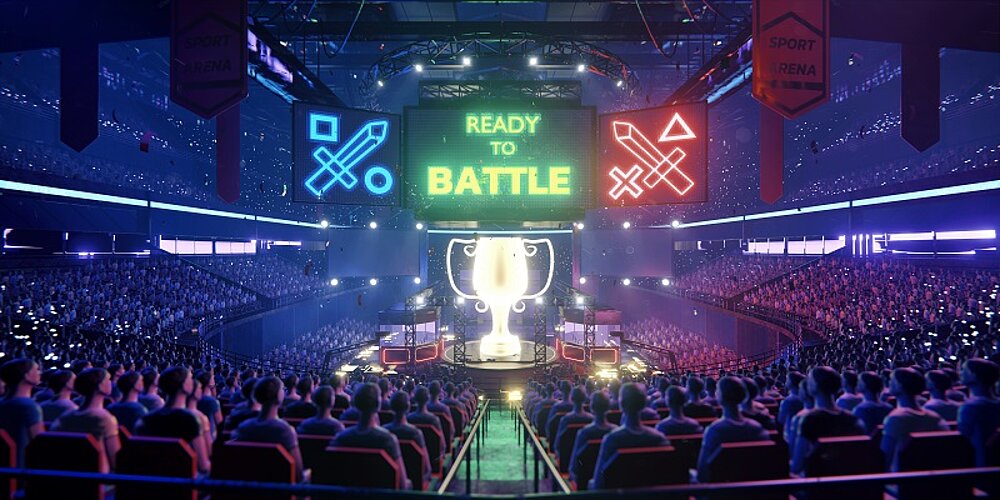Find out today what the legal world will be talking about tomorrow.

Esports boom leads to a big increase in trademark applications
Trademark registrations in recent years show that the exponential growth of the industry has also resulted in a new kind of competition – without much public attention: The number of trademark registration in the context of esports quadrupled, merely in the last year!
Over the last four years, the share of trademark registrations covering esports has internationally increased by almost 700%. Apparently, many companies today realized that “something to do with esports” is an important part of a modern brand portfolio and is both, a safe and sustainable investment in the future.
But there are other reasons for the exponential growth of esports trademarks: A survey of 200 executives from the esports industry conducted by the law firm Foley & Lardner and the The Esports Observer magazinerevealed that 61% of those surveyed considered intellectual property and licensing to be a “substantial risk for the esports industry”. An increase of 11% over the previous year. This shows that the industry is increasingly aware of the opportunities and risks inherent in a professional brand portfolio.
Just a few years ago, things looked quite different. In 2016 Wouter Sleijffers, back then CEO of the successful esports organisation Fnatic, stated in an interview that protecting intellectual property was not a priority for most teams. The reasons for this were mainly financial. Even today, contrary to widespread preconceptions, even large clans are not exactly swimming in money. Nevertheless, the esports market’s revenue is increasing year by year, and in 2020 it is expected to exceed one billion US dollars for the first time (Source: Statista). Time to assess whether there has been a change in thinking in the industry since 2016 – in particular among professional teams.
Analysis of esports trademark registrations
Today, more than 18,000 trademarks worldwide protect products in the esports sector. 90% of these are already registered, most of them in the USA, UK, Europe and China.
In that regard, most of those marks are filed in the following Nice classes:
- Class 25 (clothing, 4.7 %),
- Class 9 (electronic and scientific apparatus, 6.4 %),
- Class 35 (advertising and promotional business, 7 %), and Class 41 (education and entertainment, 54%).
Solely in the EU,2,291 trademarks are registered . Germany is the leader with a share of approximately 40 %.
These figures seem to be very impressive isolated. However, with over 16 million registered trademarks in Europe alone, it is clear that even four years after Sleijffer's interview, the race for trademarks has begun, but the finish line is nowhere in sight. To illustrate this in terms of sports: “football” amounts to over half a million trademarks worldwide and basketball for almost 200,000.
Accordingly, even world-famous teams can only claim manageable trademark rights. In Europe, Fnatic is the owner of just one trademark. Astralis today owns 7 trademarks, merely one with protection in the EU. Even teams like SK Gaming and BIG only have individual trademarks in their portfolio. Others – many of them international stars – are not listed in the trademark registers at all. There are, however, other examples: G2 Gaming is very well positioned with over 27 trademarks. Since obtaining its first trademark in 2014, Cloud9 has accumulated a total of 80, leaving many German professional soccer clubs in the dust (Hertha BSC, for example, has 26 brands, Schalke 04 has 36.) Of course, this does not mean that merely the quantity of trademark registrations matters, regardless of their quality. Rather, a basic trademark strategy is required to secure long-term investments. The figures make it clear, however, that there is still a lot of growth potential.
Advantages of trademarks and brand strategy recommendations
While the initial costs of research, preparation and application may seem high - to follow Sleijffer's example - the benefits a trademark offers outweigh them considerably. Websites, social media platforms and streaming channels are crucial sources of income that need to be safeguarded. Only a trademark offers this comprehensive protection. An example: esports legend Johnathan Wendel had his worldwide-famous player name Fatal1ty protected 10 years ago. This enables him to prevent third parties from selling merchandise with his name or registering "Fatal1ty" as a YouTube channel, domain or streaming channel. For the same reason, professional players like Shroud or coldzera have now also protected their names.
In addition, a trademark enables its proprietor to establish a communication channel with their customers. The products marked with the trademark can be given a special look that distinguishes them from the products of other suppliers.
Another crucial advantage is the possibility of licensing. For example, Fnatic can license their trademark to third parties without the fear of being liable for the goods produced under this trademark. And it can also provide clarity in the relationship between players and their teams, for example, whether and under what conditions the player is entitled to continue using his or her name after leaving the team.
First disputes based on protected trademarks
Legal disputes in this area have already revealed that trademark protection is not merely a matter of academic discussions.
For example, Riot Games has initiated action against the esports company Riot Squad (founded in 2019). In this case, Riot Games has accused Riot Squad of using the word "Riot" in connection with esports to exploit Riot Games' brand in this industry and deceive consumers about possible connections between the two companies.
In another example, the company FAZE Apparel successfully sued FaZe Clan in 2018 for the use of the word "faze" in connection with clothing. The FaZe Clan originally tried to register "FaZe" and "FaZe Clan Sniping with Style" as trademarks for clothing and merchandise. However, the application was rejected because of the too great similarity to FAZE. FAZE Apparel had registered their trademark in 2014. This shows one of the core problems of late trademark applications: First come, first served.
Since advertising and sponsorship still represent the largest revenue stream in the industry, we are likely see further trademark disputes between emerging companies in the industry and established brands. And those who have seriously thought about their company’s brand strategy early on will be at a big advantage.
Authors



